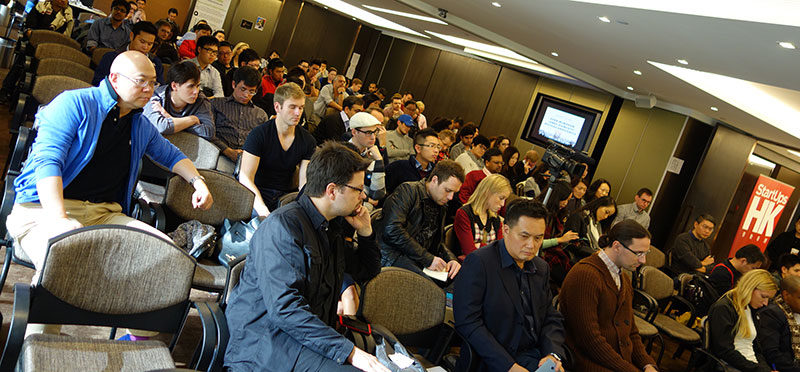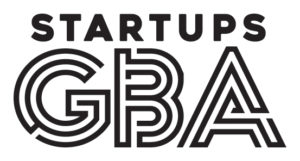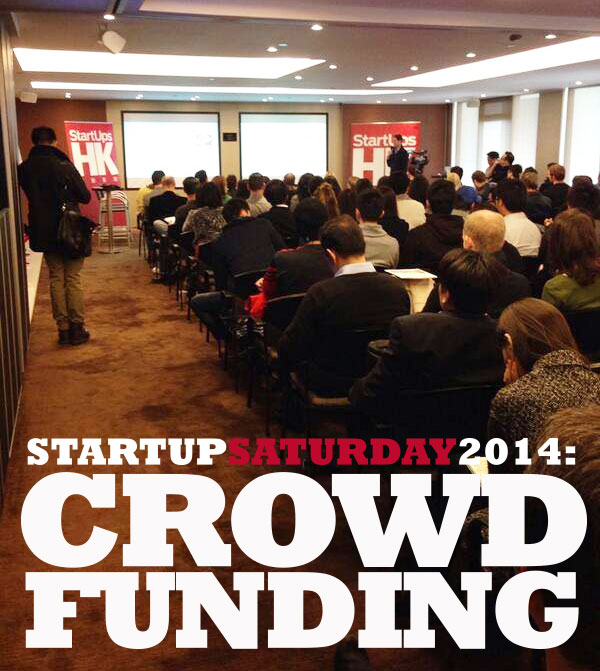
On January 25, 2014, we played host to a sold out Startup Saturday Hong Kong with a very special spotlight on the local crowdfunding scene.
With just over capacity for 150 attendees, the intimate #SUSHK event was catalyst to great synergy between experienced gurus within the crowdfunding realm and those curious about how it works. Simon Chan, a corporate partner with Dorsey & Whitney (one of our sponsors), led the panels with a keynote on disrupting the traditional commercial behavior and legal environment here in Hong Kong. He noted that the crowdfunding community will need to band together in order to embrace this new phenomenon.
In case you missed it, here’s an overview of the dynamic and disruptive ideas that were shared by a symposium of panel speakers from three groups: crowdfunding on Kickstarter, hardware manufacturing in South China, and crowdfunding capital for startups.
The Kickstarter Panel
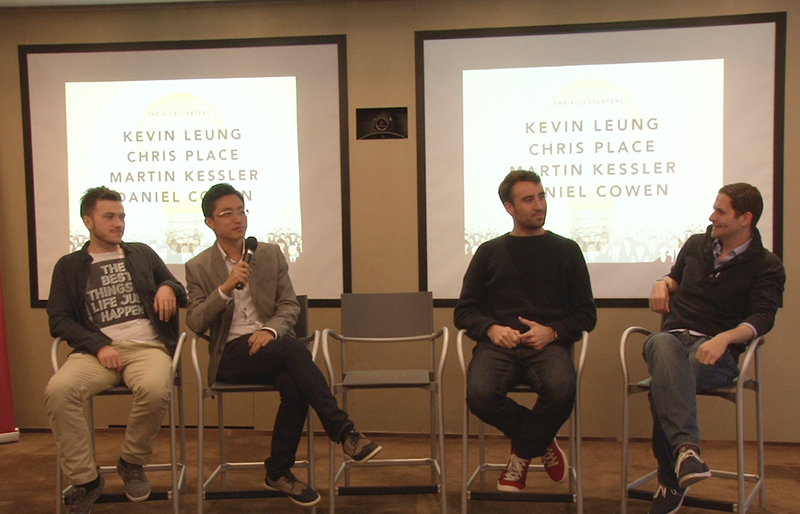
In this panel, Chris Place of Native Union, Martin Kessler of Phonejoy, Kevin Leung of Muku Shuttr and Daniel Cowen of 3Doodler paid it forward to startups hoping to build a successful Kickstarter campaign of their own.
First up, Chrisshared tips on how to create a successful crowdfunding campaign. Chris stressed the importance of having a branded product as its key to attracting distributor support. “Benefits from Kickstarter were having manufacturers and distributors contacting us, asking if we need someone to handle that side. It’s important to have a well-branded page, because distributors want a branded product.” he said. “If you can really pull it together, this could really be the launch of your company.” Read more advice from Chris here.
**Martin,**whose campaign also exceeded their goal on Kickstarter, was second up on the panel. From his experience on funding his Bluetooth game controller, Martin praised Hong Kong’s advantage as founders can readily access manufacturing resources. “In Hong Kong, you can be at the factory within a couple hours, which is something an American startup could never have,” he said. “They would have to hire someone to help them remotely or fly in, and Hong Kong startups should stress this advantage in their campaign.”
Next up was Kevin who put his remote shutter release for smartphones on both Indiegogo and Kickstarter campaigns. “There is no entrance barrier for Indiegogo so therefore you’ll see a thousand different projects in your category, and the chance of success is very low if you don’t have a strong PR team behind you,” he said. “For Kickstarter, it’s not as easy to get a ticket but the community is bigger, more active and engaged… and bloggers will be more willing to cover the story.”
In terms of press coverage, Daniel made it clear that preparation is key. “We spent three months talking to the press, isolating the writers who were interested in 3D printing and crafts-meets-technology products. It’s amazing how many people reach out to the press a few days before Kickstarter goes live – it’s almost asking not to get covered,” he said. “You’ve got to make their lives easy. Give them a press pack. And if you want to go to that extent, write a sample story.”
The Hardware Manufacturing Panel
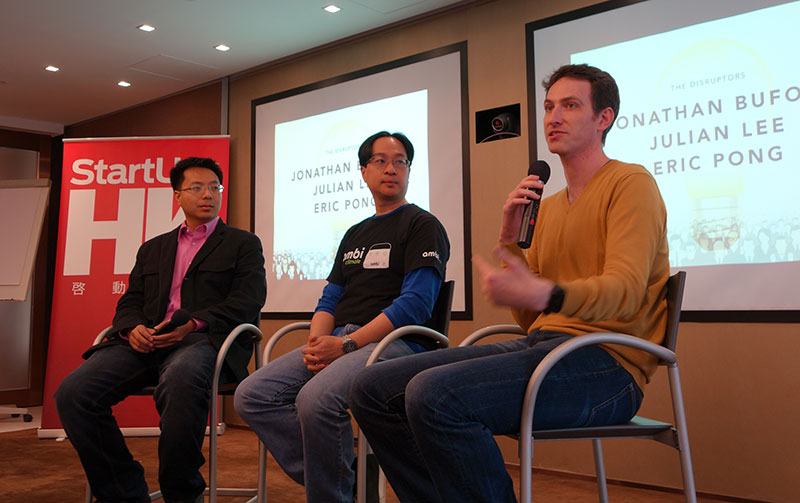
The hardware manufacturing panel, which was moderated by our own Casey Lau, had Jon Buford of Makible, Julian Lee of Ambi Climate and Eric Pong of Red Hare Fulfillment sharing their thoughts on the local hardware manufacturing scene and the numerous advantages startups have access to in Hong Kong.
To start off, Julian cited Hong Kong’s connection to China, ability to source and talent pool as large benefits for local hardware startups. “I would say that Hong Kong is like Shenzhen Plus. It has the benefits of Shenzhen plus the international legal system and expat population,” he said. “The downside is it’s still not in the manufacturing side, and it gets easy to get complacent here and not go over the border to deal with the manufacturers directly.”
As a follow up, Jon shared a disruptive idea – what if Hong Kong could become a one-stop-shop where hardware startups could manufacture their products in a local factory? “We’re actually doing all the core manufacturing for Makibox right here in Hong Kong. Hiring local workers are far more consistent than dealing with workers in China,” he said. “Now that it’s actually becoming more expensive in China, it starts making sense to start focusing operations in Hong Kong.”
Eric, who is an expert in global e-fulfillment, had great advice for startups wondering whether they should build an in-house logistics team or outsource. “When you find yourself having to hire someone or if you’re spending half your time managing shipments, packing and fulfillment,” he said, citing several signs that indicate a startup is in too deep. “If you see yourself going online and looking for shipping and warehouse solutions, that should be the red flag that you should outsource now.”
The Crowdfunding for Capital Panel
In the Crowdfunding for Capital panel which was moderated by our own Gene Soo, James Giancotti of Bigcolors, Mathias Krostewitz of Fund2.Me and Eden McMahon of SUSHK sponsors Dorsey & Whitney chatted about the local crowdfunding scene and Hong Kong’s legal environment pertaining to startups.
James kicked off the discussion by explaining how a crowdfunding for capital platform helps investors get their money out, which in turn benefits startups. “Bigcolors was the pain point for myself and a number of angel investors. We invested money into a startup and while the startup grows in value, we can’t actually get money out until there’s a sale. And that typically takes 5-6 years for that to happen,” he said, explaining that a quicker turnaround time would result in more startups getting funded. “We’re trying to build a platform where everyone wins – angel investors and startups.”
On gaining investor interest, Mathias followed up with his perspective on the benefits of Fund2.Me. Beyond the crowdfunding side, the platform also taps into crowd power to build the best team possible for projects. “We tap into our social network of industry professionals from around the world from diverse backgrounds, graphic design, automotive, aerospace, engineering,” he said. “A colorful pool of people and backgrounds offering their assistance to work on different projects, which gives investors more confidence.”
Eden rounded up the panel by giving a legal perspective on Hong Kong’s startup scene which has a lot of plus points. “It takes a long time to change laws in Hong Kong, but that’s a good thing because it’s a stable environment with a robust legal system and low tax jurisdiction,” she said. “Generally for traditional crowdfunding sites, the law already exists and it’s very friendly for that. And we have a very solid IP (intellectual property) protection here – so it really is an ideal place to startup a business.”
- More photos on our Facebook page here.
- YouTube videos coming soon.
- Presentation slides coming soon.
- See Instagram photos here.
Read all the Twitter posts here:
All in all, Startup Saturday’s are all about making connections and introducing fresh new ideas, and it’s suffice to say that the latest #SUSHK has achieved just that. We look forward to seeing everyone out at the next event!
Stories leading up to the event:
- Introducing Our Kickstarter Speakers for the Upcoming Startup Saturday Crowdfunding Hong Kong 2014
- Crowdfunding 2014 Speaker Chris Place Shares Tips on JUMP’s Successful Kickstarter Campaign
- 4 Hong Kong Crowdfunding Platforms You Should Know
- Hong Kong’s Verxigo Raises US $25,000 on Bigcolors, a Crowdfunding Platform That Helps Startups Secure Funding
We want to also thank our sponsors who’s support helped us to put on this event:
